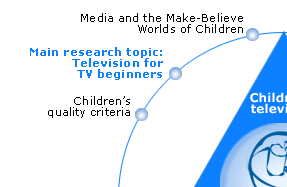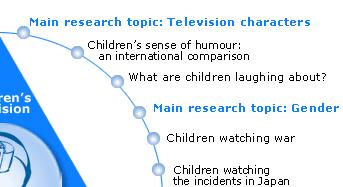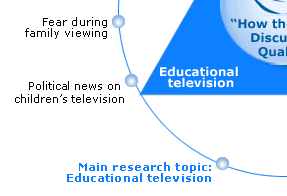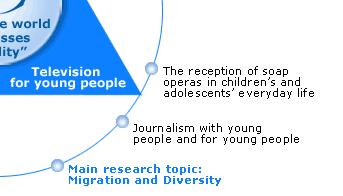 |
 |
|
 Children's quality criteria
Children's quality criteriaWhat characterises a good children's film/programme considering children's own qualitative evaluation? The term "quality" appears repeatedly in connection with children's films and with television for children. Thereby the definition of quality quite often merely mirrors the term professionalism which includes aspects of film production (plot, equipment, editing, music etc.). Arguments regarding content which stand for quality are only marginally mentioned. One of those arguments is to keep the representation as close to children's reality as possible. more ...
 Children between local and global
Children between local and globalWhat chances and possibilities does PRIX JEUNESSE offer to children? The media play a crucial role in the process of globalisation. Not only do they initiate certain processes, they also are affected by globalisation themselves. Over the past years it was possible to observe the vertical integration at all levels of production and a horizontal joining of forces of different media branches from several countries (Büttner et al. 2000, p. 21). A wave of merging and buying up of companies took place which led to the creation of a global oligopoly on the media market today (McChesney 2002, p. 24). more ...
 Information and documentary programmes for children
in 2002-2003
Information and documentary programmes for children
in 2002-2003In children's television scheduling, entertainment and fiction are the most ubiquitous genres. Conversely, parents/educators try to encourage the consumption of non-fiction genres such as documentaries but report that these types of programmes are less attractive to children. more ...  Journalism
with young people and for young people Journalism
with young people and for young peopleA study of the IZI in co-operation with the Bundeszentrale für Politische Bildung and Medienforschung Bayerischer Rundfunk/ Intendanz Young people rarely watch information programmes on (public) television. Studies suggest that this is mainly a result of the form of these presentations, and the missing perspectives of young people. In this respect, it should be a primary concern of broadcasting companies to incorporate young people more into the design of programmes. more ...
 Children watching war
Children watching warChildren's perspective on war in Iraq and television coverage For weeks it has been in the media: the war in Iraq. bombardments, wounded and dead people can be seen in the news. Children have their own perspective towards these things. They have concerns and questions. They need information, but also have the wish to announce their view of the things and their emotions. A current study by the IZI in co-operation with international researchers is investigating in what ways this children's perspective is characterised and the ways children's television is dealing with this topic. more ...
 What
are children laughing about? (2002-2003) What
are children laughing about? (2002-2003)This is a cooperative project about the understanding of children's humour, explicitly taking television into account.Children love to laugh and laugh a lot, and presumably laughing while watching television is widespread. However, in international research the question about what children are laughing about and, in particular, what aspects of a television programme they find funny, has not yet been sufficiently investigated. This is where the IZI starts and co-operates with different media researchers and communication researchers. more ...
Dragon Ball Z - between strong self-images and heightened readiness to resort to aggression At the end of 1998, RTL2 launched an animation called Dragon Ball based on the successful manga. In addition, since August 2001 Dragon Ball Z is broadcast as part of a pre-primetime programme. more...
In this study, press coverage of the topic 'children's and youth television' is analysed. Articles published within the last five years on the topics of "children and television" and "young people and television" are evaluated by means of content analysis. The quantitative content analysis focuses on: perspectives and lines of argument that journalists employ to discuss children's/youth television; on the roles they attribute to children, parents and producers; and on characteristic slogans. In a second analysis, reviews of some children's and youth programme styles in the year 2001 are surveyed and compared to "viewing rates". The press coverage of single programme titles is in the centre of this content analysis. more ...
Press coverage on the topics children's and youth television is researched. Articles from the last 5 years about 'children and television' and 'youth and television' are evaluated content-analytically. The focal points of such quantitative content analyses, amongst others, are an analysis of points of view and ways of argumentation with which journalists approach the topic of children's/youth television, which roles they assign to children, parents, producers and which slogans they are typically using. more ... In this current research project we investigate the fantasies of 8- to 9-year-old children. What kind of wishes do these children have? What, who and how would they like to be and which motives do they use? The study will be conducted as a cross-cultural comparison and as comparison of generations. more...
 The
reception of soap operas in
children's and adolescents' everyday life The
reception of soap operas in
children's and adolescents' everyday lifeThe phenomenon that children not only watch children's programmes but are also extremely fond of Daily Soaps is well known, but the background has hardly been researched in Germany - an interesting aspect currently being developed in a new IZI-Project. more...  Family
television from a parental point of view Family
television from a parental point of viewConclusions from the results of a survey among parents conducted with several online-panels in April 2001 Television has been an issue in families with children for a long time. When children discover television, conflicts soon develop. Especially with younger children, in everyday life, parents encounter their kid's manifold resistance to their ideas of quality and to strict rules for watching TV. Television has therefore become the number one discussion topic between parents and their children and ranks two on the list of argument topics, right after discussions about going to bed. more...  How
are children dealing with Schloss Einstein? How
are children dealing with Schloss Einstein?How do children deal with Schloss Einstein? In the frame of the study "The significance of soap operas in everyday life of children and youth" a partial study was carried out concerning the children's weekly Schloss Einstein (The Einstein Castle). The series was discussed during group discussions with 392 elementary school children, while 40 frequent Schloss Einstein viewers were interrogated in individual interviews. From this empirical material a qualitative statement can be framed regarding what children like about Schloss Einstein, what it means to them on a more than superficial level and the ways in which this programme is being discussed in peer group and families. more...  Togetherness
and exclusion: the significance
of Big Brother for children Togetherness
and exclusion: the significance
of Big Brother for childrenBig Brother actually is a programme which was primarily aimed at the younger part of the advertising target group, the 19- to 39-year-olds. But the ratings showed its enormous success with the adolescents and the marketing-share is even high among the 6- to 13-year-olds. Of course, we know that children and pre-teens do not only watch classic children's television, but also programmes which are not at first intended for them. However, we have a particular social responsibility for that younger audience. In order to evaluate the meaning of Big Brother for children and pre-teens, and to take positive and problematic moments of reception into consideration, reception studies are necessary. more...  A
contemporary review of children's television 2002 A
contemporary review of children's television 2002This annual survey of children's television aims to provide a report on the development of children's television in Germany and on children's viewing habits. Moreover, this project offers multiple empirical approaches to the analysis of the programme offer with regard to children's television use. more (in German)...  What
fascinates children about Pokémon? What
fascinates children about Pokémon?Anyone who currently has anything to do with children will certainly have come across them, the "pocket monsters". Pokémon is at present the most popular series among the 6- to 13-year-old boys and girls. The programme on RTL 2 scores top viewing ratings, the Gameboy games are found everywhere and school playgrounds at times resemble a bazaar for Pokémon trading cards. There are not a few teachers who would like the children to be able to learn irregular words just as quickly as they can say "Bulbasaur – Ivysaur– Venussaur" or "Charmander – Cone – Charizard". Pokémania has proliferated. more...
|
|||||||||||||||||||||||||||||||||
| The IZI is
an institution of the Bayerischer
Rundfunk (Bavarian Broadcasting Corporation, BR) |


 Synopsis:
Synopsis:


